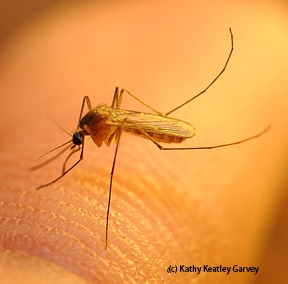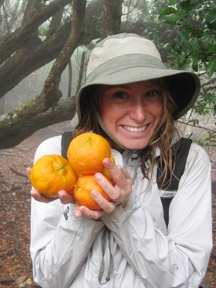- Author: Kathy Keatley Garvey

But have you ever wondered which hosts Culex mosquitoes prefer?
Tara Thiemann, postdoctoral scholar in the William Reisen lab at UC Davis, will discuss host favorites when she speaks on "Survey of Culex Bloodfeeding Patterns in California" at the next UC Davis Department of Entomology seminar, set from 12:10 to 1 p.m., Wednesday, May 23 in 122 Briggs.
As a postdoctoral researcher, Thiemann works with Reisen, a noted medical entomologist, on studies investigating novel assays to identify current and emerging arboviruses in California.
"Culex tarsalis and members of the Culex pipiens complex are the primary vectors of WNV in California," Thiemann notes in her abstract. "Both mosquito species feed on a variety of avian hosts, as well as disease-susceptible mammals, such as horses and humans, so determining the bloodfeeding patterns of these mosquitoes is a critical component in understanding the transmission dynamics of WNV throughout the state."
The research project involved identifying bloodmeals from more than 2500 mosquitoes, and identifying hosts, including avian, mammalian and reptilian.
Thiemann, who received her doctorate in entomology in 2011 from UC Davis (dissertation: “Bloodfeeding Patterns of Culex tarsalis and the Culex pipiens complex in California”) says her research shows that variation in bloodfeeding patterns "primarily resulted from differences in host availability and abundance."
Several species, including the house sparrow, house finch, mourning dove, and domestic dog, proved frequent hosts throughout the state, Thiemann points out, "and highly competent corvids, Western scrub-jay, yellow-billed magpie, and American crow, were fed upon more frequently than in previous studies."
If you miss her talk, not to worry. The UC Davis Department of Entomology plans to record it and it will be posted in about two weeks on UCTV.


- Author: Kathy Keatley Garvey

An article in the July 21st edition of Nature asked that very question.
Author Janet Fang, an intern in Nature's Washington, D.C., office, wrote that "Malaria infects some 247 million people worldwide each year, and kills nearly one million. Mosquitoes cause a huge further medical and financial burden by spreading yellow fever, dengue fever, Japanese encephaltis, Rift Valley fever, Chikungunya virus and West Nile virus."
So, how about a world without mosquitoes? "Would anyone or anything miss them?" she asked.
Fang went on to ask scientists that very question. But the fact is, they're here and they're not going anywhere--except over here to bite us.
Meanwhile, over in the UC Davis Department of Entomology, two graduate students just received William Hazelton Memorial Fellowship Awards to further their mosquito research.
Tara Thiemann (top photo), a doctoral candidate studying with major professor William Reisen, received $2100 for her statewide research on bloodfeeding patterns of Culex mosquitoes. She studies both urban and rural populations of mosquitoes and their host meals.
Jenny Carlson (bottom photo), an incoming doctoral student who will be studying with major professor Anthony 'Anton' Cornel, received $2000 for her research on avian malaria parasites.
Thiemann's project involves analyzing the blood meals of Culex mosquitoes to identify specific host species--research important toward understanding both the maintenance and epidemic transmission of the West Nile virus.
The award memorializes William “Bill” Hazeltine (1926-1994), who managed the Lake County Mosquito Abatement District from 1961-64 and the Butte County Mosquito Abatement District from 1966-1992. He was an ardent supporter of the judicious use of public health pesticides to protect public health. He continued work on related projects until his death in 1994.
Hazeltine studied entomology in the UC Berkeley graduate program from 1950-53, and received his doctorate in entomology from Purdue University in 1962.
UC Davis medical entomologist Bruce Eldridge eulogized Hazeltine at the 2005 American Mosquito Control Association conference. His talk, "William Emery Hazelton II--Rebel With a Cause," was later published in the Journal of the American Mosquito Control Association. (See PDF)
It's good to know that Hazeltine's cause lives on through his family's generosity.

- Author: Kathy Keatley Garvey
William C. Reeves (1916-2004) would have been proud.
Remember William "Bill" Reeves? A renowned entomologist, professor and dean at UC Berkeley, he was widely regarded as the world's foremost authority on the spread and control of mosquito-borne diseases.
His legendary work continues in the form of the William C. Reeves New Investigator Award, a statewide award given to the best scientific paper submitted and presented at the annual Mosquito and Vector Control Association of California conference.
This year the winner of the Reeves New Investigator Award holds special significance.

Tara Thiemann, the 2010 recipient of the Reeves New Investigator Award, studies with Reisen, her major professor.
Thiemann, a doctoral candidate in the UC Davis Department of Entomology, won the award for her work, “Evaluating Trap Bias in Blood Meal Identification Studies,” She received $1000 and a plaque at the 78th annual MVCAC meeting, held in Sacramento.
Thiemann’s research involves analyzing the blood meals of Culex mosquitoes throughout California and identifying host prevalence and feeding patterns.
This is crucial research, as infected Culex mosquitoes transmit West Nile virus and other killer diseases.
Thiemann, who joined the Entomology Graduate Program in 2004, received her bachelor's and master's degree in biology from Truman State University, Kirksville, Mo. In 2008 she won a William Hazeltine Student Research Fellowship for her Culex mosquito studies.
Two other graduate students, also affiliated with CVEC, received second and third-place awards in the Reeves New Investigator Award competition.
M. Veronica Armijos, a doctoral student in comparative pathology, won second place with her presentation on “Distribution and Prevalence of Novel Flaviviruses in California.” She received $500.
Christy Andrade, a doctoral candidate in the Microbiology Graduate Group, won third for her presentation on "Effect of Temperature on West Nile Virus Replication in Different Host Cell Types: Potential for Altered Transmission Cycles in California." She received $250.
The students are advised by Reisen and Aaron Brault of the CVEC faculty. Brault is an adjunct associate professor in the Department of Pathology, Microbiology and Immunology, UC Davis School of Veterinary Medicine, and a research microbiologist, Centers for Disease Control and Prevention (CDC).
CVEC faculty member Bruce Eldridge, emeritus professor of entomology and former director of the UC Mosquito Research Program--and also one of Reeves' colleagues--presented the awards.
Eldridge remembers collecting many a skeeter with Reeves (see photo below).Meanwhile, congratulations to the new breed of mosquito researchers (and soon-to-be UC Davis Ph.Ds): Thiemann, Armijos and Andrade.




- Author: Kathy Keatley Garvey
Who hates termites? Raise your hands.
Those dratted termites damage our homes, decks, furniture, fence posts and other wooden materials.
But at the 95th annual UC Davis Picnic Day on Saturday, April 18, you’ll see termites “walk the line”--ala the Johnny Cash song--between 10 a.m. and 4 p.m. at Briggs Hall.
(Too bad Cash didn't sing about termites "walking the plank." But then, termites wouldn't "walk the plank"--they'd eat it.)
Tara Thiemann, one of the graduate students in entomology coordinating the activity, will
The termite will walk the line.
It so happens that a chemical in certain ink pens smells just like a pheromone, so they'll follow the trail.
Not all pens, however, are created equal in the pheromone category. Many contain no pheromone-like scent. And those that do certainly aren't labeled: "Attracts termites."
Lisa Reimer, a malaria mosquito scientist who received her doctorate in entomology last year from UC Davis, told us that it's too bad that we can't use the termite trail "technology" to draw termites out of our homes.
"Like draw a line right out the front door," she quipped.
"But," she added, "it doesn't work that way."
Unfortunately.




